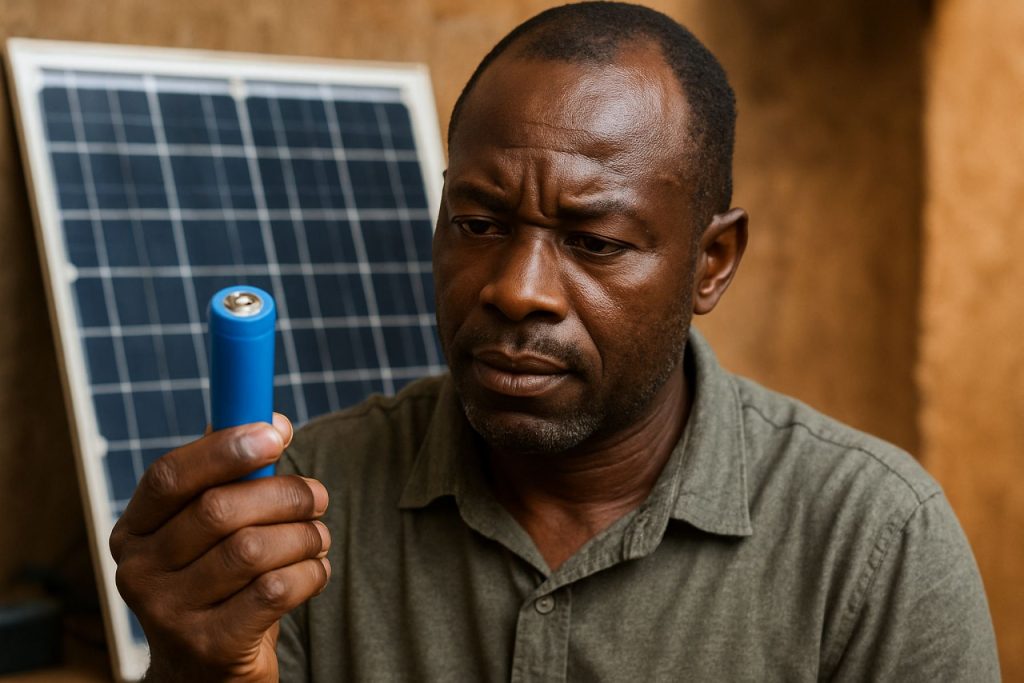
- Kofa, a clean-tech company in Ghana, has secured $8 million to expand its battery-swapping network across West Africa.
- The innovative battery-as-a-service model enables electric mopeds and small businesses to access clean, affordable power—reducing reliance on petrol and cutting emissions.
- Support comes from investors like PASH Global, Shell Foundation, and the UK’s Transforming Energy Access program, emphasizing both financial returns and social impact.
- With plans to deploy 6,000 portable batteries and expand to Kenya and Togo, Kofa is driving regional electrification efforts.
- The smart technology platform provides real-time battery management and affordable, dependable energy for users.
- Kofa’s approach offers a scalable clean energy solution in areas with unreliable power grids, signaling a major step for sustainable urban mobility in Africa.
A quiet yet powerful transformation is surging through the streets of Accra and beyond, as fresh green swaths of innovation cut a path through a continent hungry for energy. Kofa, a dynamic clean-tech force nestled in Ghana’s bustling heart, has clinched $8 million in strategic funding—fueling an ambitious push to electrify everyday life across West Africa.
Picture a cityscape where electric mopeds zip along fume-free. At neighborhood kiosks, riders swap drained batteries for fully charged ones in minutes, all with the tap of a smartphone. This seamless experience isn’t some distant dream; Kofa is making it reality with its expanding network of battery-swapping stations—and a fleet poised to deploy 6,000 portable batteries within the next year.
The funds powering this leap come from heavyweight backers including impact investor PASH Global, the pioneering Shell Foundation, and the UK government’s Transforming Energy Access initiative. Together, they form a coalition committed not only to profits, but to meaningful improvements in everyday West African lives.
Kofa’s battery-as-a-service model upends the traditional approach to electricity access. Forget the fumes and uncertainty of petrol generators. With a modular battery network, Ghana’s delivery drivers, small shop owners, and even households can tap into reliable, sustainable power—wherever they are. The implications ripple far beyond mere convenience. Electric two-wheelers and small businesses alike cut loose from fossil fuels, steering cities toward cleaner air and greener streets.
PASH Global will steer the deployment and ongoing care of swap stations, while Kofa’s tech team focuses on the brains of the system: seamless connectivity through a mobile and web platform. From battery health monitoring to real-time availability, technology puts power—literally—in the hands of users, ensuring both affordability and dependability.
This vision extends well past Ghana’s borders. Kofa has sights set on Kenya and Togo next, aiming to spark a continental shift in how Africans access and use energy. As the world chases solutions to the climate crisis, the ingenuity springing from Africa’s tech ecosystem demonstrates how tailored, scalable innovations can change trajectories far more than headline-grabbing megaprojects.
Energy specialists believe battery-swapping models like Kofa’s could rewrite the rules in regions where grid reliability remains elusive. According to the World Bank, over 600 million people in sub-Saharan Africa still lack access to electricity—a challenge ripe for creative answers that leapfrog legacy infrastructure.
With new capital, growing expertise, and an unwavering mission, Kofa stands ready to electrify not just scooters and shops, but the very concept of what clean energy access can mean in West Africa.
The takeaway: Smart technology and bold investment are catalyzing a silent energy revolution in Africa’s cities, lighting a path for the rest of the world to follow. The shift to accessible, clean power is no longer a promise—it’s already sparking to life.
For more about global energy solutions, see International Energy Agency and World Bank updates.
Why Kofa’s Battery-Swapping Model Could Change Africa Forever: What You Need to Know
Introduction: The New Era of Clean Mobility in Africa
Kofa’s battery-as-a-service model in Ghana is not just an innovative project—it’s the beginning of a fundamental shift in how energy is accessed, distributed, and used across Africa. While the original article outlines the basics, let’s dive deeper into the facts, untapped potential, and implications this transformation could have for individuals, businesses, and the entire region.
—
Additional Facts & In-Depth Insights
1. Behind the Scenes: How Kofa’s Battery System Works
– Modularity and Standardization: Kofa’s batteries are designed with a modular approach, making them adaptable to various vehicle models and small-scale appliances. This increases compatibility and scalability across different markets.
– Real-Time Monitoring: The smart tech powering Kofa’s network allows real-time tracking of battery health, location, and charge state through both mobile and web platforms, which minimizes downtime and maximizes operational efficiency.
2. Market Potential and Industry Trends
– Rapid Urbanization Drives Adoption: With Ghana and much of West Africa experiencing urbanization rates above 50% (source: UN Habitat), the demand for micro-mobility and decentralized energy solutions is exploding.
– Projected Market Growth: According to Allied Market Research, the African electric two-wheeler market is expected to reach over $3 billion by 2030, spurred by tech adoption and climate initiatives.
– Leapfrogging the Grid: Battery-swapping networks allow many African countries to bypass traditional grid expansion—a concept endorsed by the International Energy Agency (IEA).
3. Use Cases and Applications
Real-World Examples
– Delivery and Logistics: Motorcycle couriers and delivery drivers get back on the road in under five minutes by swapping batteries instead of charging for hours. This is critical in a country where e-commerce and on-demand services are growing fast.
– Micro-Retailers and Shop Owners: Small businesses can power lights, POS systems, and refrigeration using Kofa’s portable batteries—ensuring commerce continues even during grid outages.
– Residential Backup: Households can use Kofa’s batteries as a reliable, clean alternative to noisy generators.
—
4. How-To: Using Kofa’s Battery Swap Stations
1. Download the Kofa App: Register an account and locate the nearest swap station.
2. Reserve or Walk In: Find an available, fully charged battery in real time.
3. Swap and Go: Hand over your depleted battery, receive a fully charged one, and continue your journey.
4. Payment: Pay-per-swap or choose a monthly subscription for frequent users.
—
5. Industry Comparison: How Does Kofa Stack Up?
– Kofa vs. Gogoro: Gogoro’s famous battery-swapping in Asia serves as a blueprint, but Kofa’s solution is custom-built for Africa’s urban and rural conditions.
– Kofa vs. Traditional Charging: Charging stations can take hours and require stable grid power. Kofa’s swap model slashes downtime and operates independent of grid fluctuations.
—
6. Features, Specs, and Pricing (Based on Industry Norms)
– Battery Capacity: Expected to range from 1.5 to 3kWh—enough for most urban commutes or a full business day for small storefronts.
– Subscription Models: Early indications suggest pay-per-use or affordable monthly plans that lower upfront costs for users.
– Network Growth: 6,000+ batteries and dozens of swap stations are targeted in the first phase.
—
7. Security, Safety & Sustainability
– Battery Traceability: Each battery is IoT-enabled, reducing theft and misuse.
– Sustainable End-of-Life: Kofa is expected to partner with recycling initiatives for battery disposal and repurposing, in line with emerging African E-waste regulations.
– Emission Reductions: Each electric swap replaces petrol engines, unlocking measurable drops in urban air pollution (WHO data shows Accra regularly exceeds safe air quality limits).
—
8. Controversies, Limitations, and Challenges
– Infrastructure Gaps: Expansion to semi-urban and rural areas may be slowed by poor road access or limited digital literacy.
– High Initial Investment: While $8M is significant, scaling continent-wide may require greater capital as logistics and demand grow.
– Battery Supply: Ensuring ethical sourcing of lithium and cobalt remains a challenge across the global EV industry, including Africa.
—
9. Insights, Predictions, and Expert Opinions
– Unlocking New Jobs: The International Renewable Energy Agency predicts that localized clean-tech networks like Kofa’s create new employment opportunities, from station maintenance to app support.
– Potential for Mini-Grids: Kofa’s batteries could evolve into the backbone of community micro-grids, powering not just vehicles and shops, but also clinics and schools during emergencies.
– Continental Rollout: With Kenya and Togo in the pipeline, expect Kofa and similar networks to push into East and Central Africa, possibly linking with pan-African electric mobility policy frameworks.
—
Answers to Pressing Reader Questions
Is it affordable for everyday Ghanaians?
Yes, battery swapping is designed to be cheaper per kilometer than buying petrol, and costs can be spread via pay-as-you-go models.
What about compatibility with existing vehicles?
Kofa’s modular batteries are being developed to fit a wide range of two-wheelers and small appliances.
How reliable is the service?
Real-time monitoring ensures swap stations are stocked and batteries are healthy, with digital support available.
Can batteries power more than vehicles?
Yes, households and businesses can use these batteries for lighting, refrigeration, and electronics.
Is it environmentally friendly?
Swapping to electric reduces both carbon emissions and local air pollutants compared to petrol motorcycles and generators.
—
Actionable Recommendations & Quick Life Hacks
– Eco-Friendly Commuting: If you live in Accra or another launch city, switch to electric mopeds and use swap stations—it’s faster, greener, and often more cost-effective.
– Start a Battery-Enabled Microbusiness: Leverage Kofa’s batteries to power a street stall or local shop for longer, earning more and reducing downtime.
– Stay Updated: Follow clean energy news from trustworthy sources like the IEA and World Bank for opportunities as electrification expands in Africa.
—
Conclusion: The Road Ahead
Kofa’s model proves that Africa doesn’t have to wait for massive grid expansion to embrace clean energy and e-mobility. Through innovative battery-swapping, West Africa is leapfrogging straight into a sustainable future—one where clean power enables new businesses, healthier cities, and unprecedented economic growth. Whether you’re a commuter, entrepreneur, or policymaker, the transformation is happening now—so get ready to plug in and power up!
—
Related keywords: Kofa battery swap, electric scooters Ghana, West African e-mobility, clean energy Africa, battery-as-a-service, Kofa funding, green tech Accra, battery subscription Africa, sustainable mobility, energy access Africa



